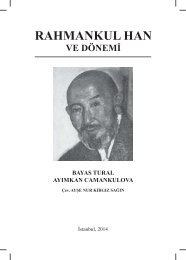THE SOVIET HISTORIOGRAPHY AND THE QUESTION OF KAZAKHSTAN’S HISTORY
SOVYET-TARIH-YAZICILIGI-ENG
SOVYET-TARIH-YAZICILIGI-ENG
Create successful ePaper yourself
Turn your PDF publications into a flip-book with our unique Google optimized e-Paper software.
196<br />
<strong>THE</strong> <strong>SOVIET</strong> <strong>HISTORIOGRAPHY</strong> <strong>AND</strong><br />
Identity Descriptions in the Turkish Community of Volga-<br />
Ural Region (Thirteenth Century–Early Twentieth Century)<br />
Volga-Ural region experienced the rules of Volga Bulgarians’ State,<br />
Golden Horde Khanate and Kazan Khanate in chronological order between<br />
ninth and sixteenth centuries. After the official conversion of the<br />
Volga Bulgarians’ State to Islam at the beginning of the tenth century,<br />
the native population rapidly began to adopt Islam. According to the<br />
identifications of historians, the name “Bulgarian” inherited from Volga<br />
Bulgarians in Volga-Ural region during the Golden Horde period, the<br />
description “Muslim” referring to a certain religious identity and a social<br />
term “Tatar” were used simultaneously. It is presumable that the term<br />
“Tatar” was used for the administrative and elite echelons of the Golden<br />
Horde Khanate; whereas, the descriptions “Bulgarian” and “Muslim” were<br />
used for the native population. 365 After the fragmentation of the Golden<br />
Horde Khanate and its replacement by the Kazan Khanate in Volga-Ural<br />
region, the description “Kazanian” was added to these three names. 366<br />
After the annexation of the Kazan Khanate by the Russian Empire,<br />
religious identity began to gain significance among the Muslim population<br />
of the region because of the subjugation to a Christian authority.<br />
As a reaction to the Christianisation policy carried out by the Russian<br />
Empire with varying degrees frequently including harsh methods, the<br />
Muslim population of the region firmly stuck to the Muslim identity.<br />
The legacy of the Volga Bulgarians has a unique significance in this<br />
context. In the religious-didactic works written by the clerics of the<br />
Volga Bank geography in the seventeenth and eighteenth centuries, the<br />
story of the conversion of the Volga Bulgarians to Islam had a special<br />
place. 367 With the impact of these commonly-popular religious works<br />
which were taught at the schools and madrasahs as course books, the<br />
imaginations about Volga Bulgarians began to represent the starting<br />
point for the Volga Bank Muslim population in religious terms. 368<br />
According to expert Allen J. Frank, the narratives about Volga Bulgar-<br />
365 We have to assert that the Volga Bulgarians’ State officially adopted Islam at a<br />
very early date (early tenth century) and the Golden Horde Khanate officially converted<br />
to Islam only in mid-fourteenth century.<br />
366 Fehretdinov, R. G., Tatar halkı hem Tatarstan tarihı, Megarif, Kazan 1996, pp.<br />
182-183.<br />
367 Gibatdinov, M., Stanovleniye i Razvitiye Metodov Prepodavaniya Istorii Tatarskogo<br />
Naroda i Tatarstana, Alma-Lit, Kazan 2003, p. 17.<br />
368 “Bulgarı”, Tatarskaya Entsiklopediya, C. 1, Institut Tatarskoy Entsiklopedii AN<br />
RT, Kazan 2002, p. 492.



